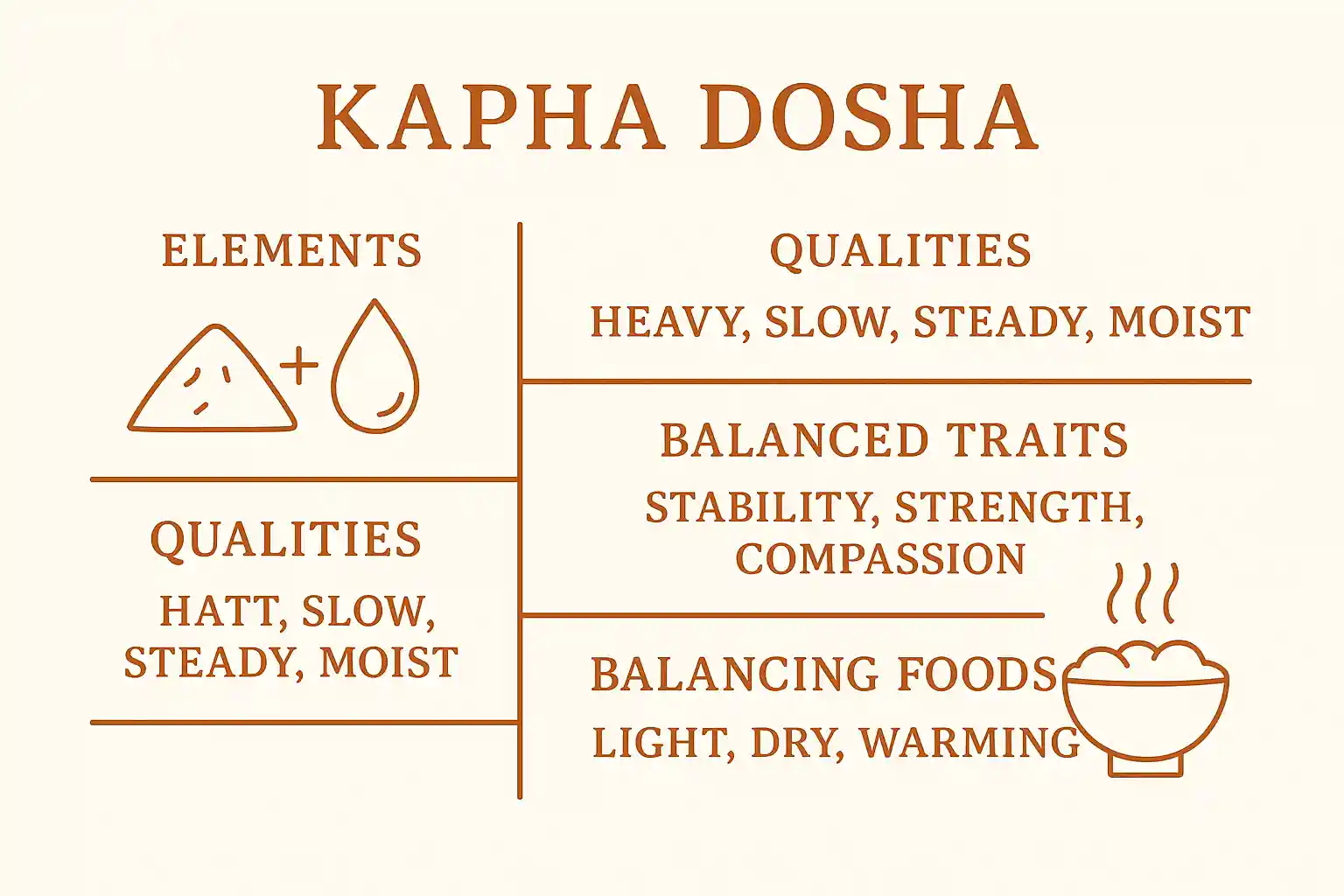What Is Kapha Dosha?
In Ayurveda, Kapha Dosha is one of the three vital energies that govern your mind-body system, alongside Vata and Pitta. Each Dosha is made up of two of the five great elements (Pancha Mahabhutas):
Kapha = Earth + Water
Kapha provides structure, stability, and lubrication — it is the force of cohesion in the body. Just as Earth provides solid form and Water binds and nourishes, Kapha holds your physical structure together and sustains tissues.
"Kapha gives strength, steadiness, and endurance."
Everyone has all three Doshas, but your unique balance (your Prakriti) determines how they express in your body and mind. Your current state (Vikriti) reflects how your Doshas are balanced or imbalanced at any given time.
The Qualities (Gunas) of Kapha
Kapha expresses through these core Gunas or qualities:
- Heavy
- Slow
- Cool
- Oily
- Smooth
- Dense
- Stable
- Soft
- Cloudy
These qualities give Kapha its grounding and nourishing nature — but if Kapha becomes excessive, they can lead to stagnation and congestion.
Kapha's Role in the Body and Mind
Physical Functions
- Providing physical structure and form
- Building and nourishing tissues (Dhatus), especially Rasa (plasma/lymph) and Mamsa (muscle)
- Lubricating joints and organs
- Maintaining immunity and resilience (Ojas)
- Supporting sexual and reproductive health
Primary seats of Kapha in the body: Lungs, Stomach, Chest, Sinuses, Joints
Mental/Emotional Functions
- Promoting calm, patience, and compassion
- Creating emotional stability
- Supporting memory and long-term learning
Signs of Balanced Kapha
When Kapha is balanced, you'll experience:
- Strong, steady constitution
- Healthy skin and joints
- Robust immunity
- Emotional stability and compassion
- Good endurance and physical strength
- Deep sleep and clear thinking
Signs of Kapha Imbalance
When Kapha accumulates excessively (due to lifestyle, diet, season, or stress), its heavy and dense qualities may predominate, leading to:
Physical Signs
- Sluggish digestion
- Congestion or mucus buildup
- Weight gain
- Fluid retention (water weight)
- Lethargy or excess sleepiness
- Dull skin tone
Mental/Emotional Signs
- Mental dullness or brain fog
- Depression or emotional heaviness
- Resistance to change
- Attachment or possessiveness
Factors That Aggravate Kapha
Kapha is increased by Kapha-like qualities in food, environment, and behavior:
- Heavy, oily, sweet, salty foods
- Cold weather or damp environments
- Lack of movement / sedentary lifestyle
- Oversleeping or napping during the day
- Emotional attachment or clinging
Kapha-Pacifying Diet and Lifestyle
| Category | Kapha-Increasing (Avoid) | Kapha-Balancing (Favor) |
|---|---|---|
| Food Qualities | Heavy, oily, cold, sweet, dense foods | Light, dry, warm, spicy, stimulating foods |
| Meal Timing | Large meals, eating when not hungry | Smaller meals, eating only when truly hungry |
| Favorable Tastes | Excessive sweet, salty, sour | Pungent, bitter, astringent tastes |
| Grains | Wheat, oats, rice (white) | Barley, millet, quinoa, buckwheat |
| Vegetables | Sweet potatoes, tomatoes, cucumbers | Leafy greens, broccoli, cabbage, sprouts |
| Proteins | Heavy meats, cheese, yogurt | Legumes, tofu, small amounts of fish |
| Dairy | Milk, butter, heavy cream | Buttermilk, low-fat alternatives |
| Lifestyle | Excessive sleep, sedentary behavior | Regular exercise, active lifestyle, variety |
| Activities | Inactivity, oversleeping, comfort eating | Vigorous exercise, yoga, dynamic movement |
| Environment | Cold, damp, stagnant conditions | Warm, dry, stimulating environments |
Best Foods for Kapha
To balance Kapha, favor foods and tastes that are:
- Light, warm, and dry
- Bitter, Pungent, Astringent (Rasas that reduce Kapha)
Examples:
- Spices (ginger, black pepper, turmeric, cinnamon)
- Bitter greens and astringent vegetables
- Legumes and pulses
- Grains like barley, millet, quinoa
- Light fruits (berries, apples, pomegranate)
Foods to Limit
- Heavy, oily, creamy foods
- Sweet, dense desserts
- Cold drinks and foods
- Dairy (cheese, yogurt, milk)
- Fried foods
Lifestyle Tips
- Prioritize daily movement and vigorous exercise
- Wake early, avoid oversleeping
- Favor stimulating, creative activities
- Keep warm and dry in cold, damp weather
- Practice letting go — mentally and emotionally
Daily Routines (Dinacharya) for Kapha
- Rise before sunrise
- Perform invigorating self-massage (Garshana or dry brushing)
- Favor active morning routines
- Avoid heavy breakfasts if appetite is low
Seasonal Guidance for Kapha
Kapha season = Late winter through spring
During this time, Kapha naturally tends to accumulate. Favor light, warming, stimulating foods and routines to prevent congestion and sluggishness.
Kapha and Digestion
Kapha's heavy, moist qualities can dampen Agni (digestive fire), especially when aggravated.
Common signs of Kapha digestion:
- Slow metabolism
- Lack of appetite
- Heaviness after eating
- Craving for comfort foods (sweet, creamy, heavy)
To support digestion:
- Favor spices
- Eat lighter evening meals
- Avoid overeating
- Stay physically active after meals
Kapha and Emotional Health
Balanced Kapha fosters:
- Calm and emotional resilience
- Compassion and empathy
- Deep loyalty and commitment
Imbalanced Kapha can lead to:
- Depression or emotional heaviness
- Inertia or lack of motivation
- Difficulty letting go of relationships, emotions, or possessions
Emotional balancing tips:
- Create variety and stimulation in daily life
- Engage in regular creative or learning activities
- Use invigorating aromatherapy (e.g., eucalyptus, rosemary)
Final Thoughts
Kapha Dosha is the foundation of your body's strength, resilience, and ability to endure. It gives stability to both body and mind — but when out of balance, it can cause sluggishness and stagnation.
By learning to recognize Kapha qualities and adjust your food, lifestyle, and emotional patterns accordingly, you can keep this nourishing energy flowing freely.
Key principles:
- ✅ Favor light, warm, dry foods and experiences
- ✅ Stay active and embrace variety
- ✅ Cultivate emotional flexibility and lightness
- ✅ Balance rest with dynamic engagement
Frequently Asked Questions
Common questions about Kapha Dosha
Related Articles

Understanding the Three Doshas: Your Guide to Ayurvedic Constitution
Discover the three vital energies that govern your body and mind. Learn how understanding your unique dosha constitution can transform your approach to food, lifestyle, and daily wellness.
6 min read
What Is Pitta Dosha? Understanding Your Fire & Water Constitution
Discover the transformative energy of Pitta Dosha - the fire and water constitution that governs metabolism, mental sharpness, and leadership qualities. Learn how to balance your inner fire.
12 min read
